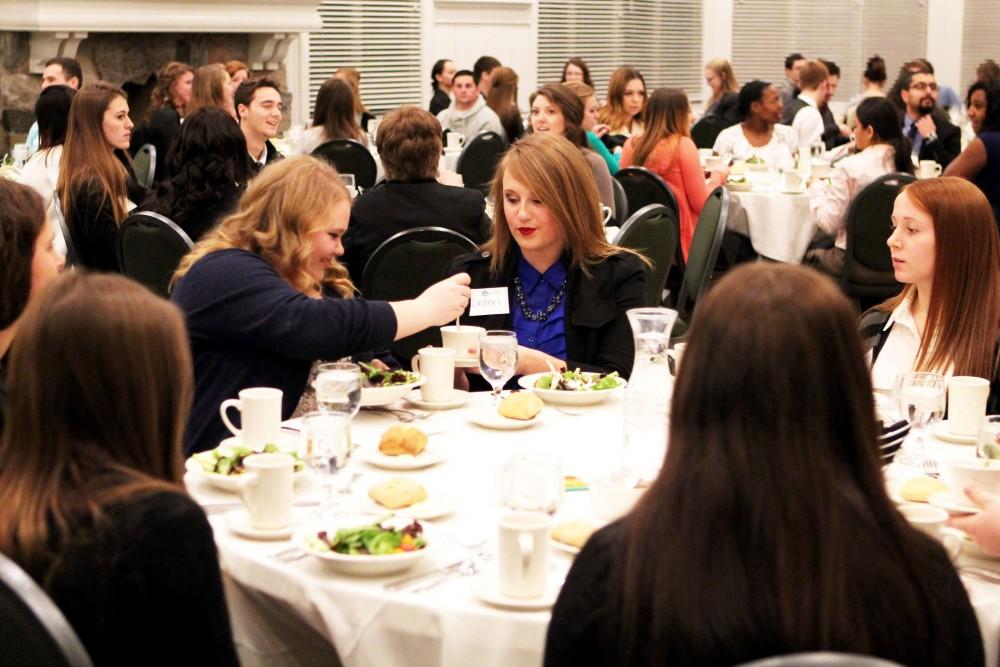Etiquette dinner teaches professionalism

GVL / Emily Frye
Feb 16, 2015
What is professionalism? Is it the opposite of golf sandals and sweatpants? Most college students get the gist of it. Professionalism is a manner, an act, to help one’s chances of employment. Dress nice, act police and so forth. But what about etiquette and the other unspoken laws of sophistication? Do they still matter?
Now, as ever, they do.
“There’s kind of an air that goes with it,” said Nathan Axdorff, a graduate assistant at the Grand Valley State University Career Center.
Axdorff hosted the etiquette dinner at the GVSU Alumni House Wednesday, Feb. 11, where students had the opportunity to brush up on or learn new dining techniques.
Many companies seeking new employees still stress the importance of these skills, he said.
“They expect a knowledge of etiquette,” Axdorff said.
Some employers will take potential employees out to formal dinners to ensure they have those skills before hiring them for a corporate position, he added.
At the etiquette dinner, the students practiced the continental style of dining, which originated in Europe. Today, continental dining is more than just a European model.
“It’s becoming a global thing,” he said. “Continental dining is practiced by global companies, including those in the U.S.”
But etiquette is more than just fork and knife placement and selecting the right spoon for the right course.
“If you’re going out with an employer, there are rules for ordering, rules for ordering alcohol,” said Kate Lozon, another graduate assistant who attended the etiquette dinner.
Etiquette, and professionalism in general, is really about thinking on your feet, whether or not you’re at the dinner table.
“Every situation is going to be different,” Lozon said.
Not all companies obsess over etiquette, and some of the traditional rules are getting a little archaic, Axdorff said.
But the skills are valuable, and attending an etiquette dinner is always a good refresher, Lozon added.
“There’s always a lot of new information,” she said.
That information can be a valuable part of a professional repertoire. And one can never be too prepared.
“It’s better to err on the side of over-professional than under,” said Rachel Becklin, an assistant director at the Career Center.
Every company is different, so those who can adapt to different situations are in the best position to be hired, she said.
“There’s a sense of culture within every organization,” she said. “It takes some time to become fully comfortable.”
But professionalism isn’t just a guise. It isn’t the opposite of being oneself.
“You’re still genuine and sincere while you’re being professional,” Becklin said.
It’s also one’s ability to follow through with tasks, to communicate well and to have a strong work ethic. It hinges in the premise of being respectful, she said.
The Student to Professional Conference on March 20 is the next big opportunity for students to learn how to communicate in a professional way.
“Sometimes just being in an environment is important,” Becklin said.
And the more experience you have, the time more times you share a really good resume, the better your chances at landing a career.
However, professionalism isn’t just forks, knives and handshakes, and it isn’t just suits and ties.
“There’s more to being a professional than the way you look,” Becklin said.
It’s an ownership of oneself, and those who stand out, even in those little, gestural ways, have the greatest chance to succeed.
“There’s a benefit to going that extra step,” she said.

























